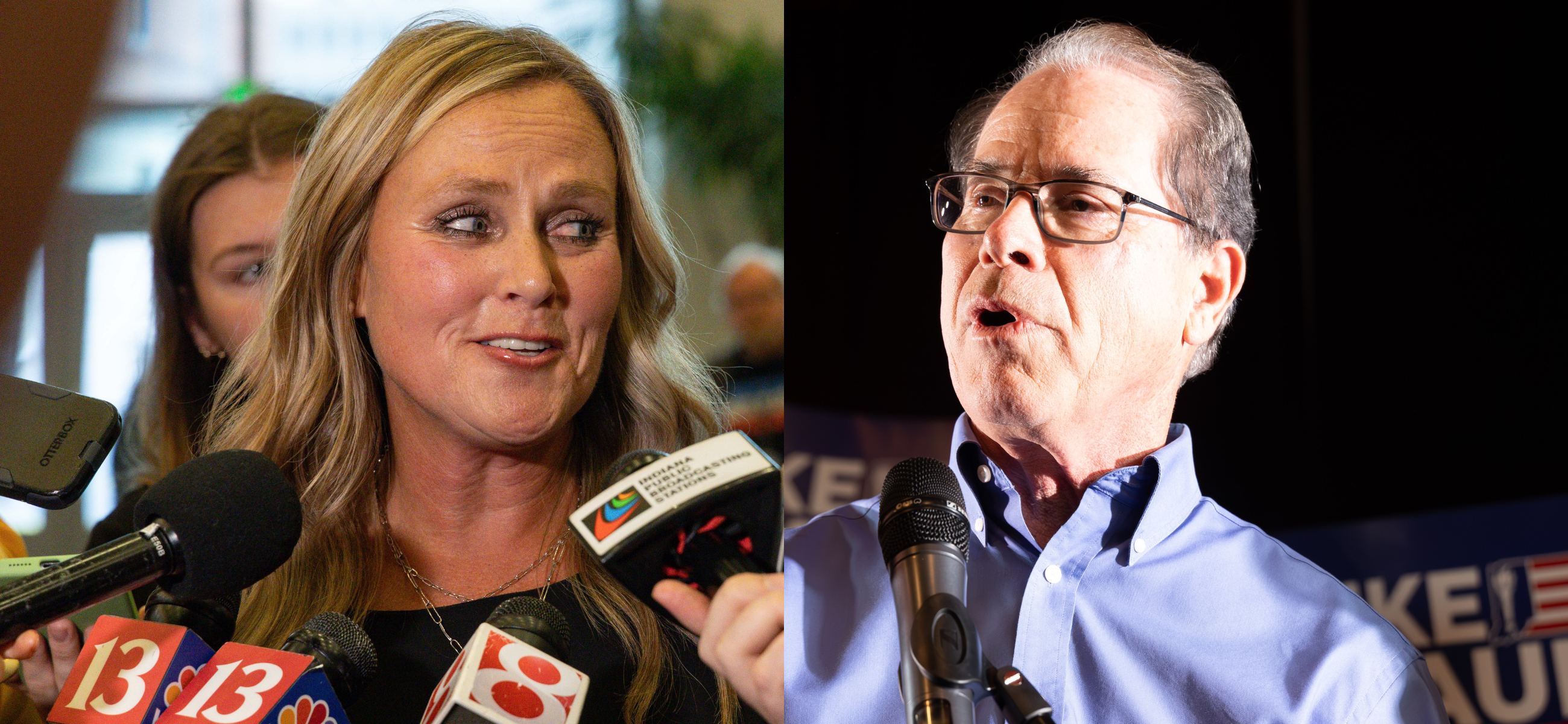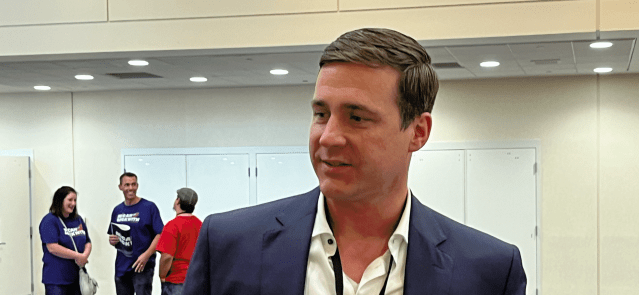Stay ahead of the curve as a political insider with deep policy analysis, daily briefings and policy-shaping tools.
Request a Demo
Democratic gubernatorial candidate Jennifer McCormick, left, and Republican gubernatorial candidate Mike Braun. (Credit: Mark Curry)
- Candidates differ on education, property tax plans
- Braun and McCormick agree on medical marijuana
- McCormick opposes abortion ban; Braun says state “got it right”
Voters will soon decide who will lead Indiana for the next four years, as two starkly different candidates vie for the governor’s office.
U.S. Sen. Mike Braun, a Republican, and former Superintendent of Public Instruction Jennifer McCormick, a Democrat, have stark ideological differences when it comes to key issues like abortion, taxes and education.
State Affairs compiled information from the candidates’ platforms and public statements to compare where each stands on several key issues. Here is how they line up.
Education
Braun’s education plan calls for universal private school vouchers.
“Reform the Choice Scholarship Program to allow every Hoosier family, regardless of income, race, ZIP code, or other factors, to choose the school that best fits their children’s educational needs,” said a policy paper from the Braun-aligned group Hoosiers for Opportunity, Prosperity and Enterprise that his campaign distributed.
Braun’s platform includes raises for teachers in “high-impact areas” but does not specify an exact amount. He also wants to expand a state program that allows professionals with college degrees to fill teaching positions. Increased security grants for school safety are in the plan as well.
In her education plan, McCormick proposes a $60,000 minimum salary for all teachers.
“It’s time that we make sure that we’re treating teachers the way we need them to be treated — like the professionals they are,” she said at an August news conference.
McCormick also calls for universal pre-K and affordable child care solutions, as well as increased restrictions on the state’s private school voucher program. She said the state’s public school system has already lost some $1.6 billion to privatization through charter school and choice scholarship funding and that this money is going to families making $220,000 a year.
Abortion
As a senator, Braun has long supported abortion restrictions.
In 2020, he called for the Supreme Court to reexamine Roe v. Wade. In 2023, he proposed federal legislation that would have required parental notification before any unemancipated minor could seek an abortion. He said at the time: “Hoosiers put their trust in me to stand up for the unborn, and that’s what I’ve been proud to do every day in the Senate.”
During the first gubernatorial debate, Braun said the state “got it right” when it enacted a near-total abortion ban.
“We’re a right-to-life state, backing the sanctity of life,” Braun said. “When our Legislature took it on they talked to their constituents, to Hoosiers. It has withstood the courts weighing in. So it is a bill that sanctifies life — we’re a state that does that, with reasonable exceptions. The people have spoken. Legislators have listened, and we got a bill that seems to be working for Hoosiers.”
In a May interview with State Affairs, McCormick said her candidacy represented a referendum on reproductive rights.
“I’m going to fight to restore those rights under any authority I can, working in a bipartisan fashion, using our committees, board and our agencies,” she said.
McCormick addressed the issue in the first debate: “I don’t see how any elected official can say it’s working. We already have women dying in Indiana. We have stories being told every day.”
She continued, “I trust women; I trust health care providers. I believe in the standards set by Roe. It’s time we return to that.”
Marijuana
In an interview with State Affairs earlier this month, Braun acknowledged cannabis reform might present a possible revenue source for the state as it struggles with Medicaid costs.
During the first debate, he signaled his openness to legalizing medical marijuana.
“We are surrounded by four states,” he said of Michigan, Ohio, Illinois and Kentucky, which have some level of legalized marijuana. “Medical use is something we need to look at. I’ll be doing what makes sense.”
In September, McCormick released a marijuana plan that called for immediate legalization of medicinal cannabis with the potential for recreational use down the road. She also called for the creation of a cannabis commission to oversee the industry.
Asked about marijuana at the first debate, she said her plan would “bring in $170 million in revenue and tens of thousands of jobs.”
Property taxes
In July, Braun released a property tax reduction plan that would entail a 3% cap on annual property tax increases, dropping to 2% for seniors and families with young children.
Braun suggested property taxes would return to 2021 levels under his plan, which also called for beefing up homestead deductions and forcing tax referendums to be held in general election years.
The proposal did not specify what effect it would have on local governments and school districts, which would lose out on hundreds of millions of dollars in funding as a result.
McCormick’s plan, released in August, focuses on lowering income taxes as a means of property tax relief. The proposal would raise the deductions for homeowner property taxes, renters’ income taxes and state and local taxes.
The deductions would largely draw money from the state’s $2.5 billion surplus rather than from local governments.
She called for a 10% cap on annual property tax increases.
Immigration
Braun’s television ads have touched on border security, and his platform calls for increased focus on the issue.
“Joe Biden and the left have created a humanitarian and national security crisis on our southern border,” his online platform reads. “As governor, Mike will continue to support and enact the America First policies that were working. Otherwise, every town will become a border town.”
McCormick criticized Braun in the second debate for voting against a bipartisan immigration bill. Braun said the bill would have allowed up to 5,000 illegal immigrants into the country per day.
McCormick’s border-related plans focus more on facilitating legal immigration.
“We will work with local, state and federal officials in supporting an immigrant system that creates a safe, timely, orderly and humane pathway for those seeking legal immigration while keeping our communities and those responsible for border security safe,” her online platform reads.
Contact Rory Appleton on X at @roryehappleton or email him at [email protected].
Know the most important news affecting Indiana
Get our free weekly newsletter that covers government, policy and politics that impact your everyday life—in 5 minutes or less.
The man behind the governor: Josh Kelley’s journey to Indiana leadership
As Gov.-elect Mike Braun’s transition team and priorities take shape, his right-hand man prepares to lead the staff tasked with ensuring the incoming governor’s vision becomes reality. Josh Kelley has quickly established a political career marked by several key achievements, including anchoring two statewide campaign victories, serving as Braun’s chief of staff in the U.S. …
COLUMN: Trump should seek Ukraine NATO membership on day 1
INDIANAPOLIS — The North Atlantic Treaty Organization is a military alliance founded in 1949 following World War II to keep Soviet influence in check. The United States is one of 12 founding members. There are 32 members, including Canada, the United Kingdom, Germany, Poland, France, Spain and Italy. Article 5 of NATO’s charter states that …
Howey Politics Indiana celebrates 30th anniversary
Storied Indiana political columnist Brian Howey was honored Tuesday at a gala celebrating his 30th year at the helm of his namesake newsletter, Howey Politics Indiana. Howey was joined at the event by his wife Susan, his fellow State Affairs teammates and political insiders. Know the most important news affecting Indiana Get our free weekly …
Incumbents win in 2 tight Indiana House races; Cash-Stoner outcome uncertain
The election outcome remained uncertain in one Indiana House district where Republican incumbent Becky Cash was leading Democrat Tiffany Stoner by less than one-tenth of a percentage point. Two other House incumbents — Republican Rep. Dave Hall and Democratic Rep. Wendy Dant Chesser — prevailed with narrow victories that aren’t expected to face recount challenges. …




